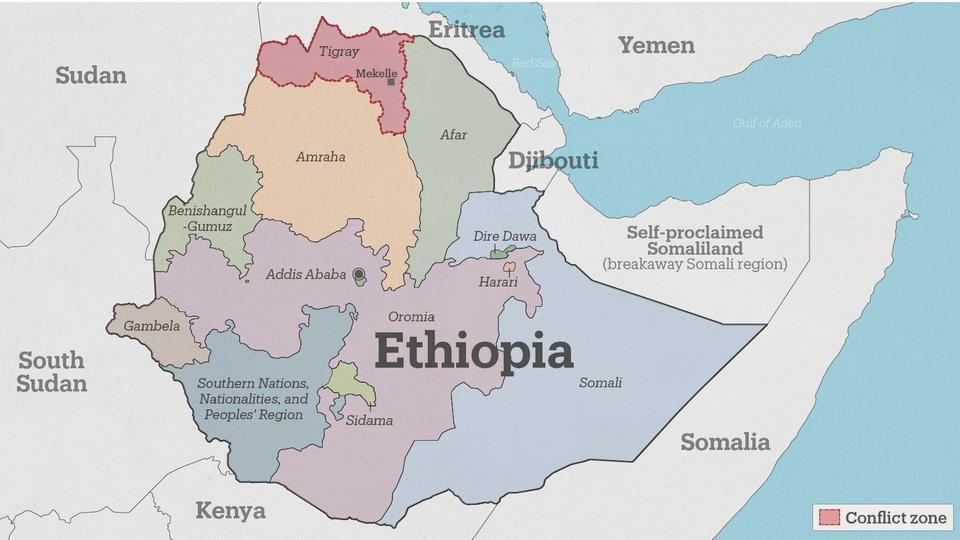- Africa
“Justice Must Be Served”: Rebels bring woes to Ethiopia’s Amhara

‘I await divine justice’: Rebels bring woes to Ethiopia’s Amhara
Amhara residents say Tigrayan fighters unleashed a campaign of horror during a five-month occupation of the area.
On September 10, 2021, three young men routinely tending to cattle on the main road in the Doro Gibir farming community on the outskirts of the northern Ethiopian city of Woldia, paused to check on crops their family was growing at a site near the country’s A2 highway.
It was their last act alive, a heartbroken Tiru Mengesha, mother of 17-year-old son Demissie Wubo, aunt to Ayele Aragie, 18, and cousin to 38-year-old Yimer Tadesse, told Al Jazeera.
“I can’t even eat those papayas any more,” she said, referring to crops harvested at a plot of farming land outside their home, a tukul structure made from a combination of straw and dried soil, in Doro Gibir. “My boys planted them.”
Ayele was an engineering student at Woldia University, while Demissie had completed some vocational courses at a small technical institute in the city. Yimer left behind a wife and two young children, aged five and seven.
Family members told Al Jazeera – as Tiru was unable to discuss the details without breaking into tears – that fighters loyal to the Tigray governing Tigray People’s Liberation Front (TPLF) saw the unarmed trio and “slowed their vehicle to shoot at them before speeding off”.
“I personally collected the bodies of my brothers,” Belay, cousin to Ayele and Demissie, said. “I blame [Prime Minister] Abiy Ahmed, who neither armed us nor protected us from the TPLF. Ethiopia has no leader.”
Revenge attacks
Since November 2020 when Abiy deployed troops to Tigray, thousands of people have died, even as millions remain displaced.
In the 16-month civil war, Ethiopian troops and allied soldiers from neighbouring Eritrea have committed a litany of abuses including torture, weaponised rape and targeted killings of Tigrayans.
The atrocities have fuelled resentment and triggered a Tigrayan recruitment drive, which bolstered the ranks of the TPLF’s armed wing. Ethiopian and Eritrean soldiers were driven out of much of Tigray by late June 2021, and counterattacking Tigrayan fighters eventually pushed into the neighbouring Amhara and Afar regions.
Reports of revenge attacks began emerging shortly afterwards. In early August, Tigrayan fighters razed an Amhara farming community. Amnesty International documented sexual violence committed by Tigrayan fighters in occupied areas. Last month, the rights organisation published a report which unearthed killings and gang rapes.
“We confirmed that sexual violence in the towns of Kobo and Chenna was commonplace and weren’t simply isolated incidents,” Donatella Rovera, Amnesty International’s senior crisis response adviser told Al Jazeera. “I’ve also spoken to people who, while fleeing the fighting, had seen bodies strewn along the way.”
In response to the report, the US State Department stated that it was “gravely concerned” by mounting reports of abuses by TPLF-affiliated militias.
Despite a lull in the conflict late last year, the hostilities have resumed. Tigrayan rebels fought their way south from Tigray through the Amhara region towards the Ethiopian capital, Addis Ababa, which they had threatened to assault as recently as November. They eventually retreated, relinquishing captured territories following a drone-backed Ethiopian army counterattack.
The renewed fighting has displaced 300,000 people in the country’s northeastern Afar state, east of the war-torn Tigray region. It is the latest front in the war between the federal-allied forces and fighters loyal to the TPLF.
Now, residents of the Amhara region are also decrying abuses by Tigrayan fighters who controlled swaths of the region for almost six months in 2021. “They would knock on doors, enter and rob residents,” said Gashaw (last name withheld on request), a resident of Woldia, one of the first main Amhara municipalities to fall under the control of Tigrayan fighters, who advanced along the A2 road, displacing hundreds of thousands.
“If you resisted, they’d shoot,” he told Al Jazeera. “I know of five people they killed.”
Testimonies like Gashaw’s have been recurring throughout a conflict previously described as a “dirty war,” by an Ethiopian military commander.
While the Ethiopian government estimates that repairing infrastructural damage in the Amhara region could take up to three decades, the recovery process for survivors has been far more complicated to take into account.
No ‘iota of humanity’
Months after the three were buried, mourners were still streaming into the community to comfort the family. Even today, an inconsolable Tiru Mengesha is still struggling to cope.
“I cry when I see my son’s friends because I know they will go home but my boys won’t,” she said.
The TPLF fighters who killed the trio were driving from the town of Kobo some 40km away, where uprisings by local farmers had led to reprisal killings of civilians, Belay said. “I’m sure it was revenge. They lost men and took their anger out on my brothers.”
His account corresponds with testimonies accumulated by Amnesty International, which discovered that Tigrayan fighters keen on avenging losses oversaw summary executions of 20 people in Kobo on September 9, the eve of the murders of Demissie, Ayele and Yimer.
“While in some areas, fighters depended on locals who had no choice but to provide them with food and water, in others, killings of civilians seemed to be linked to reprisals for losses sustained by the TPLF in the context of fighting,” Rovera explains. “This was certainly the case in the towns of Chenna and Kobo.”
Getachew Reda, spokesman of the TPLF, did not respond to Al Jazeera’s email regarding the killings.
Victims of rape meanwhile, which has been rampant throughout the war, are largely believed to be suffering in solitude. Last year, Al Jazeera documented gruesome incidents of rape committed by both Ethiopian and Eritrean forces in Tigray.
“In Amhara, as in other parts of Ethiopia, survivors are not aware of where they should go … or don’t have the financial means to afford the transportation,” says Fatima Sator, a communications officer at the International Committee of the Red Cross, which has delivered 3,800 dignity kits for survivors in the region.
“Often, survivors are stigmatised by their communities and even rejected by their own family,” she added. “They are so afraid of being harassed that they don’t tell anyone what has happened to them and don’t seek help.”
In November, Amnesty International’s Secretary General Agnes Callamard told Al Jazeera that crimes recorded in the testimony of more than a dozen rape victims in the Amhara town of Nefas Mewcha “defy morality or any iota of humanity.”
Tewodrose Tirfe, chairman of the US-based Amhara Association of America advocacy organisation, told Al Jazeera that his group has tallied 930 victims of sexual violence at the hands of TPLF-allied fighters.
“The psychosocial needs of victims remain largely ignored,” Tewodrose explained. “To illustrate this, one can look at the case of a woman in the (Amhara) town of Hayk who became mentally ill after being gang raped by TPLF fighters. There are also cases of traumatised people who witnessed family be murdered or gang raped by TPLF soldiers.”
Amid the wave of atrocities, communications outages cut off millions from the outside world, leaving family members outside of the region desperate for news of their loved ones.
For Mekides Aragie, sister of Ayele and a domestic worker in Saudi Arabia, the restoration of communications meant learning of the deaths of her brother, cousin and uncle and the beginning of her mourning process.
“Thinking of them hurts me profoundly, I can’t even describe the pain of being away from home during this sorrow,” she told Al Jazeera.
Mekides’ regular remittances had funded much of Ayele’s education, and she was eager to see him graduate. “They tell me that they are no more,” she said. “So, I await divine justice.”





